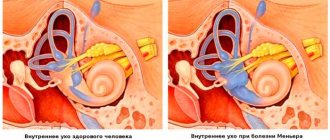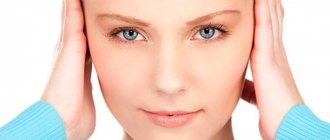What does it mean if you feel dizzy when standing up or lying down? Can home and folk remedies help? When is it time to see a doctor? Let's look at the reasons for this problem and how to combat it.
So why do you feel dizzy when you lie down or get up? The feeling of dizziness is always unpleasant and alarming. There are always reasons for such a state, and there are quite a lot of them. Before starting treatment, it is important to identify the specific trigger, rather than treat the symptom itself.
Dizziness while lying down can be a harmless feature of the body or an alarming signal that warns that a disease is developing. Medical attention is required if you experience fatigue, weakness, or nausea during dizziness.
The essence of dizziness may be that the brain does not immediately respond to changes in body position. The eyes perceive a change in posture faster, and only then does the information reach the brain. Despite the fact that this is quite unpleasant, it is worth coming to terms with this state of affairs. If this is really not a disease, it’s enough to just rest more, work less, sleep better and establish a balanced diet.
Adults, teenagers and children, men and women can get sick. In women, dizziness can often occur during pregnancy or hypotension. This condition is extremely unpleasant and uncomfortable. It seems like the world is literally spinning around you. Sometimes it is difficult for a person to even get out of bed.
What can make you feel dizzy when you lie down?
Dizziness while lying down is an unpleasant and common phenomenon. When a person assumes a horizontal position, his cardiovascular system must rearrange its work and adapt to the new position of the body in space. If you feel dizzy as soon as you lie down on the bed, even a healthy person may have this condition. It can also warn about the development of a certain disease. This occurs if a person lies on his back, on his right or left side, or if there is a sudden change in body position from vertical to horizontal.
Also, unpleasant sensations may appear when throwing back the head, or when a person tries to suddenly change position. A person may feel nauseous and may experience headaches. He tries to avoid sudden changes in position.
By the way, dizziness can accompany alcohol intoxication and a hangover. A drunk person suffers not only from dizziness, his blood pressure rises, his pulse quickens, he experiences confusion, and an unstable emotional state. In this case, you should stop drinking alcohol, and if you cannot do this, you should consult a narcologist.
Factors that can provoke dizziness include:
- Pathologies of the inner ear.
- Diseases of the endocrine system, hormonal imbalances.
- Increased pressure inside the eyes.
- Pathologies of cerebral vessels.
- Diseases of the central nervous system.
- Neuritis of the vestibular apparatus.
- Spinal injuries (closed or open).
- Orthostatic collapse.
- Meniere's syndrome.
- Osteochondrosis. Due to poor posture when a person lies down or takes a vertical position, the vertebral artery does not work well. It is quite large and supplies blood to all parts of the spine and brain. The blood flows poorly, and the brain begins to malfunction.
- Inflammation of the membranes of the brain.
- Hypertension.
- Spinal hernia.
- Vegetovascular dystonia.
- Infection of the nasopharynx and ears.
- Trauma, alcoholism. This leads to disruption of the transmission of nerve impulses to parts of the brain. With excessive alcohol consumption, as with a head injury, many neurons die and connections between brain cells are disrupted.
The reasons that we have listed are not the only ones, but they most often lead to dizziness. If this condition interferes with your work, rest, and even sleep, you should definitely share your problem with your doctor. He will help determine the provoking factor and, based on the information received, will prescribe the most suitable medicine for a particular patient. The final decision regarding therapy remains with the doctor.
Be sure to describe your condition to the doctor in as much detail as possible. It is necessary to tell when dizziness appears, how long it lasts, if the headache is on the left or right, whether there are other symptoms such as nausea, vomiting, weakness, etc. If you had a TBI, tell us which side of your head was affected and what sensations you experienced.
Causes
Currently, doctors identify more than 80 causes that can cause dizziness. The most common and requiring attention are:
- intoxication: smoking, alcohol and drug use, food poisoning;
- taking certain medications;
- diseases of the middle and inner ear (otitis, labyrinthitis, Meniere's disease, inflammation of the vestibular nerve);
- osteochondrosis of the cervical spine: due to impaired blood supply to the brain;
- stroke, cerebral ischemia and other conditions associated with acute or chronic lack of oxygen;
- migraine;
- panic attack, vegetative-vascular dystonia;
- head injuries: concussions, brain contusions;
- spinal injuries;
- brain tumors;
- hormonal changes due to puberty, pregnancy or menopause;
- anemia: dizziness is associated with insufficient oxygen supply to tissues;
- hypoglycemia (low blood glucose levels);
- motion sickness in transport, rides on attractions.
Some causes of vertigo are considered physiological and do not require medical intervention if the pathology is mild. These conditions include motion sickness, weakness and lightheadedness due to hypoglycemia or anemia, as well as dizziness during pregnancy. However, in case of severe attacks, consultation with a specialist is necessary.
Other symptoms
The condition of dizziness is often accompanied by a number of other symptoms. This may be a sign of the development of the disease. It is additional symptoms that often become decisive when making a diagnosis. It is important to tell your doctor about everything that worries you, even if such a symptom seems unimportant to you personally.
Depending on the disease that caused it, a person may experience additional symptoms:
- Vertigo is benign. In this case, dizziness worries when a person takes a certain position (lying down or standing up). Its reason lies in the fact that salts are deposited in the area of the inner ear. If the problem is in the vestibular apparatus, true vertigo is observed. It is accompanied by a strong heartbeat, noise in the ears, nausea, and hearing loss.
- Normal blood flow in the inner ear is disrupted. In this case, headaches occur, blood pressure increases, and memory is impaired.
- The inner ear is injured. Headache, nausea, vomiting, and hearing problems may occur.
- Labyrinthitis. This is an inflammatory process that affects the inner ear. This condition is accompanied by severe dizziness; it worries when a person lies on his back or turns to his side. Symptoms last for several days or even weeks. The temperature may rise.
- Neuritis. The head will suddenly feel dizzy when the person assumes a horizontal position. Vomiting is also present. Symptoms occur mainly in the morning.
- If dizziness appears at the moments when a person lies down, it may be accompanied by a temporary complete loss of hearing, and the vision begins to darken.
When suddenly standing up from a lying position, dizziness can be considered normal, but only if it is not accompanied by other symptoms. This problem can be encountered not only at night, but also during the day. Sometimes changing position immediately causes discomfort for a few seconds. Then the situation returns to normal.
If dizziness makes it difficult to even stand, you should immediately consult a doctor. This condition can cause serious illness, even cancer. In some cases, an MRI is required.
The condition when the vision becomes dark
Our entire body is permeated with a network of blood vessels, which include arteries, veins and small capillaries. The heart muscle pumps blood into the arteries, through which it rushes throughout the body. The pressure with which blood presses on the walls of blood vessels is called blood pressure.
Basically we are talking about blood pressure. Its value consists of two indicators, such as:
- systolic - the first digit in the record, the pressure that occurs at the moment of the heartbeat;
- diastolic - the second indicator, the pressure in the arteries when the heart is at rest, that is, the interval between beats.
In medical science, there are two terms that describe pathological conditions associated with deviations in blood pressure from the norm - 120/80 mmHg. Art. These are hypertension - high blood pressure and hypotension - low blood pressure. There is a form of them called orthostatic, which is a common reason why your eyes darken when you get up.
That is, the picture can be imagined as follows: a person is sitting and does not suspect anything, and as a result of some external stimulus, for example, the phone rings, he suddenly stands up and experiences darkening in his eyes, dizziness, a feeling of falling out of reality for a few seconds . Other symptoms may include:
- nausea;
- disorientation, confusion;
- weakness;
- fatigue;
- chest pain;
- a fall.
Possible reasons
The reasons that cause symptoms, which can be described as follows: “When I suddenly stand up, my vision gets dark,” include:
- elderly age;
- decreased blood volume—hypovolemia due to bleeding, elevated sugar levels, or medications;
- dehydration of the body;
- long-term immobility;
- bearing a fetus;
- heart disease;
- anemia;
- Parkinson's disease;
- diseases of organs that make up the endocrine system;
- taking medications used to treat high blood pressure;
- use of antidepressants;
- hot weather.
Treatment
Many people are concerned about the problem of what to do if they feel dizzy when a person takes a sitting or lying position, or if motion sickness appears. Treatment is not limited to simply taking a pill. You need to adjust your lifestyle, habits, learn to work correctly and get enough rest.
Therapy depends on what caused the condition. If this is temporary, passes quickly, and rarely recurs, it is worth observing your further condition. This is only if there are no other accompanying symptoms. If other unpleasant sensations appear, you should not waste time, but go to the doctor. You should take your condition especially seriously if you feel dizzy when walking or standing, or have an unsteady gait. The person may stagger and coordination of movements is impaired. Dizziness may worsen with physical activity. This indicates disturbances in the functioning of the brain and central nervous system. The reasons can be different - from urticaria to oncology.
Depending on what is bothering you, you will need to consult a therapist, neurologist, ENT specialist, etc. The help of an experienced endocrinologist is often required.
Treating such a problem is often not difficult. The decisive factor is the reason. Many patients are prescribed nonsteroidal anti-inflammatory drugs, antibiotics, and multivitamins that will help strengthen the immune system.
- Sometimes simple breathing exercises help a lot. It is performed in a sitting position, or you can lie down. You need to take a deep breath and then exhale. This process is repeated for seven minutes. The point is to saturate the blood with additional oxygen.
- You can also do a self-massage of the neck, head, and face. During the next attack, try to press your finger on the area in the middle of the forehead. Do not remove it immediately, but hold it at the indicated point for a few seconds.
- Try to focus on some object. It must be static, that is, motionless. Hold your gaze on him for a few seconds.
- It wouldn't hurt to drink good green tea regularly. It calms and gently tones. But don't make the drink too strong.
- Therapeutic exercises and reflexology can also help.
What causes dizziness when changing body position?
So why do you feel dizzy when you get out of bed, for example? The elementary laws of physics will help us understand this. At the moment when a person changes his position, gravity forces blood to accumulate in the veins of the legs and organs located in the lower half of the body. And this, in turn, somewhat reduces the amount of blood that returns to the heart, and after this the amount that the heart throws out also decreases. As a result, a drop in blood pressure occurs. The body quickly reacts to this - the heartbeat increases, and the blood vessels reduce their volume. But if such compensatory reactions are insufficient, the person develops orthostatic hypotension.
A few more tips
When you have already visited the doctor, you have been diagnosed and prescribed treatment, do not forget that it is important not only to receive proper treatment, but also to lead a correct lifestyle. You should not give in to stress, be nervous for any reason, you should give up bad habits, and you should not eat too fatty foods.
If you experience dizziness when you lie down, remember the following:
- Go to bed on time. Sleep should take at least 7-8 hours.
- Don't read in bed. Don't watch TV or do other things if you've already gone to bed, because this will strain your eyes too much.
- Try not to turn around or stand up suddenly. Unexpected movements can disturb the vestibular system from a stable state.
- Treat colds or infectious diseases promptly. If you are sick, do not forget about bed rest.
- Keep a reasonable daily routine. Work within the allotted time, try not to do things until late. Remember that it is important to be able not only to work, but also to rest. If the working day is not standardized, this is a direct path to professional “burnout” and decreased performance. Get more rest.
Diagnosis of dizziness
Diagnosis and treatment of dizziness is carried out by neurologists, vertebrologists, otorhinolaryngologists and ophthalmologists. In order to clarify the cause of dizziness, as well as prescribe the correct treatment, a patient with dizziness must undergo a series of examinations:
- Doppler ultrasound of the main arteries of the head;
- examination by an ophthalmologist;
- audiographic examination;
- CT (computed tomography) or MRI (magnetic resonance imaging);
- X-ray of the skull and cervical spine.
Prevention
Prevention of dizziness is possible, and it is quite effective and simple:
- You should eat healthy, good quality foods. Food should be as natural as possible.
- Don't forget to do as much physical activity as you can.
- It is better to sleep on an orthopedic pillow and mattress. They will protect the musculoskeletal system from pathologies.
- Take a walk outside more often. Such walks perfectly strengthen the immune system, improve well-being, and saturate the body with oxygen.
- Don't forget to do breathing exercises while lying down or sitting.
- Don’t test your body’s strength with all kinds of diets. They disrupt metabolism and reduce immunity.
Dizziness when standing up or lying down should not be ignored. It can be a symptom of some pathological process and even the appearance of a malignant neoplasm. You cannot expect the problem to be solved on its own. It is possible that this is just a feature of the body or a consequence of an incorrect way of life. If the cause lies in some disease, doctors will help cure it.
Remember that your well-being largely depends on you. Try not to give in to stress and the temptation to devote yourself too much to work.
Dizziness is a common occurrence in teenagers
As it turned out, most often with the question “why do you feel dizzy when you get up?” Teenagers turn to specialists. The fact is that this problem is caused by insufficient blood flow to the brain, associated with the lag in the development of the circulatory system at this age from the needs of a rapidly growing organism.
As a rule, orthostatic hypotension in young people from 13 to 20 years of age is perceived by doctors as a normal condition that passes as they grow older and undergo a complete restructuring of the body and only requires compliance with certain rules.
Teenagers are asked not to make sudden movements, but if necessary, sit for a while and then rise slowly. It is also important to regularly do exercises to strengthen the vestibular system.
What diseases cause orthostatic hypotension?
Diseases that affect the condition of the nerves that regulate vascular tone can also lead to the named syndrome. These include diabetes mellitus, spinal cord injuries, amyloidosis, otitis media, inner ear injuries, migraines or cluster headaches, Meniere's disease, malignant neoplasms, etc. As you can see, the answer to the question “why do you feel dizzy when you stand up suddenly?” there may be many answers.
And signs that the cause of the described dizziness is some disease and you need urgent medical attention are additional symptoms that arise:
- nausea and vomiting,
- loss of consciousness,
- periodic severe headaches,
- feeling of weakness,
- impaired coordination and balance,
- tachycardia,
- noise in ears,
- noticeable hearing loss,
- bloody discharge from the nose or ear.
If you have several of the listed problems, you should immediately consult a doctor for examination and an accurate diagnosis.
How to know if you are in danger
If you feel dizzy when you get up from your squat while following a strict diet, then the only culprit is a lack of glucose in the blood. If you received a scolding from your superiors or spoke in front of a large audience, then the described symptom that arose as a consequence should not be frightening either - in this case it is the result of a large release of adrenaline, which provoked vasospasm.
But if, after suffering from otitis media, you experience severe dizziness with cold sweat, nausea and vomiting, or your hearing decreases, and whistling or noise appears in your ears, then you should immediately consult a doctor. The same actions must be taken if, along with dizziness, severe headaches are observed, accompanied by photophobia, nausea and tinnitus. And if the patient also has impaired coordination, vision and sensitivity, then reluctance to see a doctor can cause serious consequences.
It is not difficult to understand whether you need to go to a specialist. Remember that any additional symptoms are a reason to be wary!
Summing up
Severe morning dizziness can occur due to basic oxygen deprivation of the brain. It occurs due to a sharp drain of blood from the main areas of the brain. Also the basis is various changes in the general well-being of a person or more serious illnesses.
For this reason, consultation with a specialist and treatment are so important. Features of qualified treatment depend on the causes of the condition. It may only take one competent procedure performed by an experienced doctor.
Regardless of what causes dizziness, there is no need to fear serious complications and consequences. The problem completely goes away after completing a course of a gymnastic complex aimed at improving the functioning of the vestibular apparatus.
If the condition and pathology are advanced, professional treatment will be required under the mandatory supervision of a doctor. Don’t panic, but immediately visit a professional who will prescribe competent and appropriately effective treatment.
How to recognize danger?
If dizziness in the morning when getting up is noted after following a strict diet, after squatting for a long time, this is evidence of a simple lack of glucose in the blood. If dizziness occurs after a nervous conversation with your superiors, this indicates a sharp release of adrenaline into the blood and subsequent vasospasm.
If an unpleasant phenomenon occurs after suffering from otitis media and is accompanied by vomiting, nausea and cold sweating, you should immediately consult a specialist. You should do the same in a situation where dizziness is accompanied by nausea, fear of light and severe headaches.
If there is a problem such as lack of coordination, it is strictly forbidden to postpone going to the doctor. Neglect of this rule can lead to serious consequences.
Important! The reason to contact a professional is the presence of a variety of additional symptoms. This is a direct reason to be wary.










